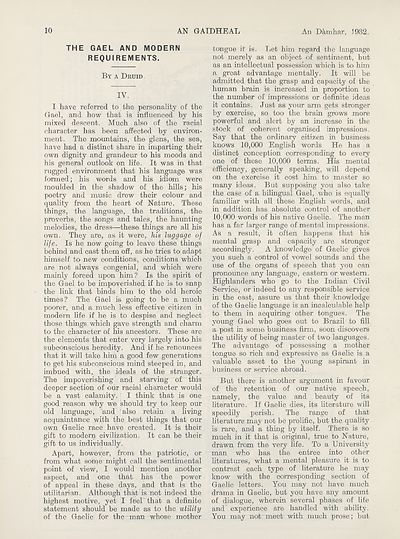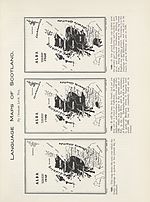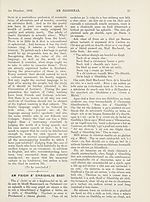An Comunn Gàidhealach Publications > Gaidheal > Volume 28, October 1932--September 1933
(22) Page 10
Download files
Complete book:
Individual page:
Thumbnail gallery: Grid view | List view

10
AN GAIDHEAL
An Dkmhar, J9B2.
THE GAEL AND MODERN
REQUIREMENTS.
By a Druid
IV.
I have referred to the personality of the
Gael, and how that is influenced by his
mixed descent. Much also of the racial
character has been affected by environ¬
ment. The mountains, the glens, the sea,
have had a distinct share in imparting their
own dignity and grandeur to his moods and
his general outlook on life. It was in that
rugged environment that his language was
formed; his words and his idiom were
moulded in the shadow of the hills; his
poetry and music drew their colour and
quality from the heart of Nature. These
things, the language, the traditions, the
proverbs, the songs and tales, the haunting
melodies, the dress—these things are all his
own. They are, as it were, his luggage of
life. Is he now going to leave these things
behind and cast them off, as he tries to adapt
himself to new conditions, conditions which
are not always congenial, and which were
mainly forced upon him? Is the spirit of
the Gael to be impoverished if he is to snap
the link that binds him to the old heroic
times? The Gael is going to be a much
poorer, and a much less effective citizen in
modern life if he is to despise and neglect
those things which gave strength and charm
to the character of his ancestors. These are
the elements that enter very largely into his
subconscious heredity. And if he renounces
that it will take him a good few generations
to get his subconscious mind steeped in, and
imbued with, the ideals of the stranger.
The impoverishing and starving of this
deeper section of our racial character would
be a vast calamity. I think that is one
good reason why we should try to keep our
old language; and also retain a living
acquaintance with the best things that our
own Gaelic race have created. It is their
gift to modern civilization. It can be their
gift to us individually.
Apart, however, from the patriotic, or
from, what some might call the sentimental
point of view, I would mention another
aspect, and one that has the power
of appeal in these days, and that is the
utilitarian. Although that is not indeed the
highest motive, yet I feel that a definite
statement should be made as to the utility
of the Gaelic for the-man whose mother
tongue it is. Let him regard the language
not merely as an object of sentiment, but
as an intellectual possession which is to him
a great advantage mentally. It will be
admitted that the grasp and capacity of the
human brain is increased in proportion to
the number of impressions or definite ideas
it contains. Just as your arm gets stronger
by exercise, so too the brain grows more
powerful and alert by an increase in the
stock of coherent organised impressions.
Say that the ordinary citizen in business
knows 10,000 English words He has a
distinct conception corresponding to every
one of these 10,000 terms. His mental
efficiency, generally speaking, will depend
on the exercise it cost him to master so
many ideas. But supposing you also take
the case of a bilingual Gael, who is equally
familiar with all these English words, and
in addition has absolute control of another
10,000 words of his native Gaelic- The man
has a far larger range of mental impressions.
As a result, it often happens that his
mental grasp and capacity are stronger
accordingly. A knowledge of Gaelic gives
you such a control of vowel sounds and the
use of the organs of speech that you can
pronounce any language, eastern or western.
Highlanders who go to the Indian Civil
Service, or indeed to any responsible service
in the east, assure us that their knowledge
of the Gaelic language is an incalculable help
to them in acquiring other tongues. The
young Gael who goes out to Brazil to fill
a post in some business firm, soon discovers
the utility of being master of two languages.
The advantage of possessing a mother
tongue so rich and expressive as Gaelic is a
valuable asset to the young aspirant in
business or service abroad.
But there is another argument in favour
of the retention of our native speech,
namely, the value and beauty of its
literature. If Gaelic dies, its literature will
speedily perish. The range of that
literature may not be prolific, but the quality
is rare, and a thing by itself. There is so
much in it that is original, true to Nature,
drawn from the very life. To a University
man who has the entree into other
literatures, what a mental pleasure it is to
contrast each type of literature he may
know with the corresponding section of
Gaelic letters. You may not have much
drama in Gaelic, but you have any amount
of dialogue, wherein several phases of life
and experience are handled with ability.
You may not meet with much prose; but
AN GAIDHEAL
An Dkmhar, J9B2.
THE GAEL AND MODERN
REQUIREMENTS.
By a Druid
IV.
I have referred to the personality of the
Gael, and how that is influenced by his
mixed descent. Much also of the racial
character has been affected by environ¬
ment. The mountains, the glens, the sea,
have had a distinct share in imparting their
own dignity and grandeur to his moods and
his general outlook on life. It was in that
rugged environment that his language was
formed; his words and his idiom were
moulded in the shadow of the hills; his
poetry and music drew their colour and
quality from the heart of Nature. These
things, the language, the traditions, the
proverbs, the songs and tales, the haunting
melodies, the dress—these things are all his
own. They are, as it were, his luggage of
life. Is he now going to leave these things
behind and cast them off, as he tries to adapt
himself to new conditions, conditions which
are not always congenial, and which were
mainly forced upon him? Is the spirit of
the Gael to be impoverished if he is to snap
the link that binds him to the old heroic
times? The Gael is going to be a much
poorer, and a much less effective citizen in
modern life if he is to despise and neglect
those things which gave strength and charm
to the character of his ancestors. These are
the elements that enter very largely into his
subconscious heredity. And if he renounces
that it will take him a good few generations
to get his subconscious mind steeped in, and
imbued with, the ideals of the stranger.
The impoverishing and starving of this
deeper section of our racial character would
be a vast calamity. I think that is one
good reason why we should try to keep our
old language; and also retain a living
acquaintance with the best things that our
own Gaelic race have created. It is their
gift to modern civilization. It can be their
gift to us individually.
Apart, however, from the patriotic, or
from, what some might call the sentimental
point of view, I would mention another
aspect, and one that has the power
of appeal in these days, and that is the
utilitarian. Although that is not indeed the
highest motive, yet I feel that a definite
statement should be made as to the utility
of the Gaelic for the-man whose mother
tongue it is. Let him regard the language
not merely as an object of sentiment, but
as an intellectual possession which is to him
a great advantage mentally. It will be
admitted that the grasp and capacity of the
human brain is increased in proportion to
the number of impressions or definite ideas
it contains. Just as your arm gets stronger
by exercise, so too the brain grows more
powerful and alert by an increase in the
stock of coherent organised impressions.
Say that the ordinary citizen in business
knows 10,000 English words He has a
distinct conception corresponding to every
one of these 10,000 terms. His mental
efficiency, generally speaking, will depend
on the exercise it cost him to master so
many ideas. But supposing you also take
the case of a bilingual Gael, who is equally
familiar with all these English words, and
in addition has absolute control of another
10,000 words of his native Gaelic- The man
has a far larger range of mental impressions.
As a result, it often happens that his
mental grasp and capacity are stronger
accordingly. A knowledge of Gaelic gives
you such a control of vowel sounds and the
use of the organs of speech that you can
pronounce any language, eastern or western.
Highlanders who go to the Indian Civil
Service, or indeed to any responsible service
in the east, assure us that their knowledge
of the Gaelic language is an incalculable help
to them in acquiring other tongues. The
young Gael who goes out to Brazil to fill
a post in some business firm, soon discovers
the utility of being master of two languages.
The advantage of possessing a mother
tongue so rich and expressive as Gaelic is a
valuable asset to the young aspirant in
business or service abroad.
But there is another argument in favour
of the retention of our native speech,
namely, the value and beauty of its
literature. If Gaelic dies, its literature will
speedily perish. The range of that
literature may not be prolific, but the quality
is rare, and a thing by itself. There is so
much in it that is original, true to Nature,
drawn from the very life. To a University
man who has the entree into other
literatures, what a mental pleasure it is to
contrast each type of literature he may
know with the corresponding section of
Gaelic letters. You may not have much
drama in Gaelic, but you have any amount
of dialogue, wherein several phases of life
and experience are handled with ability.
You may not meet with much prose; but
Set display mode to:
![]() Universal Viewer |
Universal Viewer | ![]() Mirador |
Large image | Transcription
Mirador |
Large image | Transcription
| An Comunn Gàidhealach > An Comunn Gàidhealach Publications > Gaidheal > Volume 28, October 1932--September 1933 > (22) Page 10 |
|---|
| Permanent URL | https://digital.nls.uk/127131276 |
|---|
| Description | This contains items published by An Comunn, which are not specifically Mòd-related. It includes journals, annual reports and corporate documents, policy statements, educational resources and published plays and literature. It is arranged alphabetically by title. |
|---|
| Description | A collection of over 400 items published by An Comunn Gàidhealach, the organisation which promotes Gaelic language and culture and organises the Royal National Mòd. Dating from 1891 up to the present day, the collection includes journals and newspapers, annual reports, educational materials, national Mòd programmes, published Mòd literature and music. |
|---|---|
| Additional NLS resources: |
|

